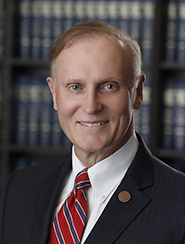Could this be the year Florida finally finds a way to fund charter school facilities?
A pair of bills, filed by Sen. David Simmons, the Central Florida Republican in charge of the upper chamber’s education budget, suggests it might be.

One of the bills, first reported by the Gradebook, would increase school districts’ optional property taxing authority. The other would guarantee, for the first time, that charter schools would get a fair share of that revenue, based on the number of students enrolled.
Right now, charters rely on uncertain annual appropriations. Funding can fluctuate year to year, but it’s recently been stuck at $75 million, far below the amount received by traditional public schools. Under Simmons’ proposal, charters could still receive annual appropriations, too.
Taking a closer look, Simmons’ proposal offers something for everyone who typically jumps into the annual slugfest over charter school facilities funding.
It has a clear benefit for charters. During the 2015-16 school year, the most recent for which budget data are available, Florida school districts raised $2.3 billion in property tax revenue. Charter schools typically don’t share that money right now. A fair pro-rata share for charters, which enroll about one in ten public school students, could yield a revenue stream worth more than three times what they currently receive through annual appropriations.
It has something for districts. School districts have thwarted past attempts to steer property tax revenue to charters. They say their own taxing authority has decreased in recent years (which is true) and that their remaining revenues are mostly tied up paying off old construction debts from past building booms, or maintaining existing schools . Simmons’ proposal would increase districts’ taxing authority by roughly 13 percent, allowing them to bring in more revenue to offset the amount that would go to charters.
It has something for charter school critics. Simmons’ proposal would revive proposals from last year that would have reined in “private enrichment” from charter school facilities. The bill would require private landowners to be independent from charter organizations that lease their buildings, and would prevent them from charging inflated rent. It would also require, in many cases, that charter school buildings wind up under public control if schools ever close.
It has something for equity advocates. Last year, the Senate re-jiggered charter school facilities funding to steer a larger share of money to schools where more than 75 percent of students qualify for free- or reduced-price lunches, or where 25 percent have special needs.
These bills could still face hurdles. They could be portrayed as a tax increase. Local school districts would have discretion over whether to increase taxes or not. They wouldn’t be forced to, but fiscal conservatives might balk at efforts to expand their taxing authority. And last year, there was some concern that the Senate’s proposed limits on private enrichment would rein in legitimate efforts to finance charter school construction with private dollars.
Still, the perennial debate over charter school facilities is starting earlier, and at a more promising point, than it has in the past. Simmons is a seasoned legislator often called upon to hash out compromises between intractable opponents. If he’s filing a bill to address a longstanding conflict before the start of the 60-days legislative session, this really could be the year.


